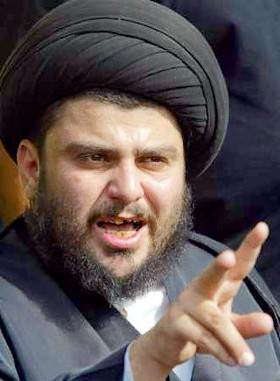Sunni-backed party that got most votes in Iraq elections warns against sectarian politics
SAMEER N. YACOUB, AP News
May 06, 2010 15:18 EDT
The Sunni-backed alliance that got the most votes in Iraq's election warned Thursday against the rise of sectarian politics after two religious Shiite blocs joined together to try to form a government.
The Iraqiya party led by secular Shiite Ayad Allawi won the most seats in parliament with strong backing from the nation's disaffected Sunnis in the March 7 elections, but it cannot form a majority government alone. Now looks as though Iraqiya will be squeezed out of first place by the new Shiite alliance, effectively losing the first chance to form a governing coalition.
"We hope that the motive and the reason behind this new alliance is purely politics and not to take sides according to the sect," Iraqiya said. "The time of sectarian and ethnical polarization has gone after it proved to be a threat to the unity of Iraqi people."
Iraq's long simmering ethnic and sectarian tensions erupted in 2006 following the destruction of a Shiite shrine and the country was brought to the brink of a civil war that resulted in hundreds of deaths per day.
The new Shiite alliance puts the two blocs just four seats short of a ruling majority in the 325-member parliament and will likely lead to another Iraqi government dominated by Shiite religious parties, much like the current one.
The Iraqiya statement pointed out that as the largest vote-getter in the election — with two more seats than Prime Minister Nouri al-Maliki's bloc — it still should be given the first opportunity to form a government.
Shortly before results were announced, al-Maliki obtained a supreme court decision saying the largest bloc formed after the election could also get the first chance to form a government — raising accusations that Allawi was being cheated out of his win.
The alliance between al-Maliki's bloc and the Shiite religious group that came in third place in the vote made top Shiite clerics the final arbiters of any dispute. The deal has raised fears that the minority Sunnis — already wary of the leadership — will be largely left out of government and sectarian tensions will boil over into more violence.
The agreement that sets down conditions for their unity gave revered Grand Ayatollah Ali al-Sistani and other top Shiite clerics the power to decide disagreements between the two partners.
But an associate of al-Sistani said Thursday the cleric had no prior knowledge of the agreement or the particular clause empowering the clerics.
"We were not consulted," the official said. "The agreement was done among the two blocs and we had no knowledge about it before it was announced." He declined to comment on whether al-Sistani had accepted the role. The official spoke on condition of anonymity because he was not authorized to speak to the media.
Al-Sistani frequently offers his counsel to senior politicians who privately seek his guidance and support but has shunned a more public or defined role.
Sporadic violence has continued during the negotiations to form a new government and on Thursday a roadside bomb exploded in western Baghdad apparently targeting a police patrol but instead killing two bystanders, according to police and hospital officials.
Police in Irbil also reported the discovery of the handcuffed and bullet-ridden body of a Kurdish journalist in the nearby city of Mosul.
Sardasht Othman, 23, wrote for a number of Kurdish publications and was kidnapped Monday, Irbil police chief Abdul-Khaliq Talaat said.
The Paris-based Reporters Without Borders condemned the killing and voiced concern about the decline of press freedom in Iraq's Kurdish ruled areas.
 South Korea is holding a naval drill in the sea today, with warships firing guns and dropping anti-submarine bombs not far from the region where the Cheonan warship sank in March, which South Korea has blamed on a North Korean attack.
South Korea is holding a naval drill in the sea today, with warships firing guns and dropping anti-submarine bombs not far from the region where the Cheonan warship sank in March, which South Korea has blamed on a North Korean attack. Commanders
Commanders 


